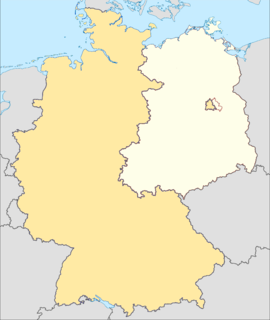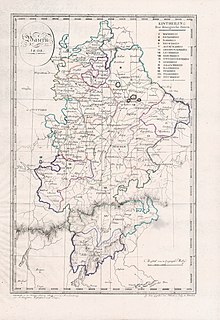
The Battle of Abensberg took place on 20 April 1809 between a Franco-German force under the command of Emperor Napoleon I of France and a reinforced Austrian corps led by Feldmarschall-Leutnant Archduke Louis of Austria. As the day wore on, Feldmarschall-Leutnant Johann von Hiller arrived with reinforcements to take command of the three corps that formed the Austrian left wing. The action ended in a complete Franco-German victory. The battlefield was southeast of Abensberg and included clashes at Offenstetten, Biburg-Siegenburg, Rohr in Niederbayern, and Rottenburg an der Laaber. On the same day, the French garrison of Regensburg capitulated.

Hemau is a small town in Southern Germany, in the district of Regensburg. The town is situated on the Tangrintel, a ridge which runs between the rivers Altmühl and Schwarze Laber.

The term Kaiserpfalz or Königspfalz refers to a number of castles and palaces across the Holy Roman Empire that served as temporary, secondary seats of power for the Holy Roman Emperor in the Early and High Middle Ages. The term was also used more rarely for a bishop who, as a territorial lord (Landesherr), had to provide the king and his entourage with board and lodging, a duty referred to as Gastungspflicht.
Aichkirchen is a village in the Upper Palatinate, Bavaria, Germany. It is part of the municipality Hemau.

A photovoltaic power station, also known as a solar park, solar farm, or solar power plant, is a large-scale grid-connected photovoltaic power system designed for the supply of merchant power. They are differentiated from most building-mounted and other decentralised solar power because they supply power at the utility level, rather than to a local user or users. The generic expression utility-scale solar is sometimes used to describe this type of project.

The Central Army Group (CENTAG) was a NATO military formation comprising four Army Corps from two NATO member nations comprising troops from Canada, West Germany and the United States. During the Cold War, CENTAG was NATO's forward defence in the southern half of the Federal Republic of Germany (FRG). The northern half of the FRG was defended by the four Army Corps of NATO's Northern Army Group (NORTHAG). During wartime, CENTAG would command four frontline corps. Air support was provided by Fourth Allied Tactical Air Force.

The Regenkreis, with Straubing and later Regensburg as its capital, existed between 1806 and 1837 as one of the 15 districts of the Kingdom of Bavaria. Between 1806 and 1808, the Kingdom of Bavaria was divided into 15 (state) districts named after rivers. In English, Regenkreis means “District of Regen” and was named after the Regen River which flowed through the district. Regenkreis was the predecessor of the Regierungsbezirks Oberpfalz.
This page is based on this
Wikipedia article Text is available under the
CC BY-SA 4.0 license; additional terms may apply.
Images, videos and audio are available under their respective licenses.








